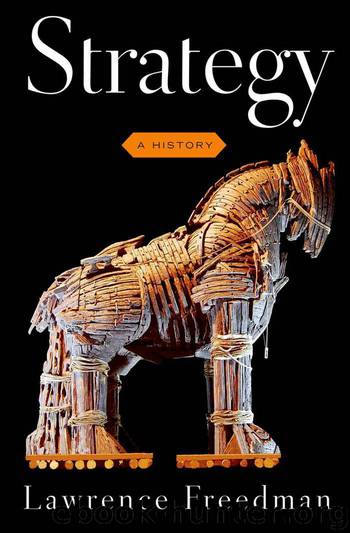Strategy by Freedman Lawrence

Author:Freedman, Lawrence [Freedman, Lawrence]
Language: eng
Format: mobi, epub
Publisher: Oxford University Press, USA
Published: 2013-05-21T19:00:00+00:00
CHAPTER 25 Black Power and White Anger
We had fed the heart on fantasies,
The heart’s grown brutal from the fare;
More Substance in our enmities
Than in our love.
—William Butler Yeats, “The Stare’s Nest by My Window”
IN THE ABSENCE of perceptible progress, the consequences of the reluctance to accept compromise and forge coalitions lay either in disillusionment and apathy or else anger and more extreme policies. This could be seen in the swift evolution of the SNCC during the course of the 1960s. SNCC’s founding statement affirmed “the philosophical ideal of nonviolence as the foundation of our purpose, the presumption of our belief, and the manner of our action.” This affirmation became strained as the SNCC activists became impatient, uncertain about what they were achieving for their pains, frustrated at the limits of their open and inclusive political style and with the restraint required by a nonviolent philosophy. They were told to play safe to keep the support of white liberals, even as the Democrats refused to disown racist politicians. They became suspicious, not only of the segregationists and police, but also of the elitism of Martin Luther King.
In the North there was already a more radical aspect to black politics. For example, Malcolm X, who converted to the Nation of Islam while in jail and became its most prominent and charismatic figure, provided a striking contrast to King’s Christian message of love and peace. Malcolm X proclaimed black separatism, denounced whites as devils, and refused to reject violence. Self-defense, he insisted, was not really violence but “intelligence.” He spoke in ways that King could not to the disaffected and frustrated blacks of the inner cities. The civil rights leaders rebuked him for stirring up racial hatred and playing to white stereotypes of blacks. Eventually he did have a change of heart. He continued to push for a distinctively black consciousness but left the Nation of Islam in 1964 and moderated his rhetoric. He was murdered soon after, in February 1965.1
A more distant influence with a clearer message was Frantz Fanon. His views developed through his encounters with French colonialism and culminated in his time in Algeria, where he went as a psychiatrist before joining the National Liberation Front (FLN). His main testament, Wretched of the Earth, was written in 1961 as he was dying from leukemia. It was later argued that the English translation of this book, and Jean-Paul Sartre’s introduction, sharpened the tone, more so than Fanon intended. His insights on colonial conditions were played down as a result of the stress on violence as the only strategic language that colonizers recognized.2 The psychiatrist in him offered an existentialist take on violence, providing the book’s intensity.
Fanon picked up on Sartre’s claim that it was not the Jewish character that provoked anti-Semitism but instead “the anti-Semite creates the Jew,” and so argued that “the settler” had “brought the native into existence and perpetuates his existence.”3 Violence was a means of escaping from this psychological as well as physical domination. “At the level of the individuals, violence is a cleansing force.
Download
This site does not store any files on its server. We only index and link to content provided by other sites. Please contact the content providers to delete copyright contents if any and email us, we'll remove relevant links or contents immediately.
| Africa | Americas |
| Arctic & Antarctica | Asia |
| Australia & Oceania | Europe |
| Middle East | Russia |
| United States | World |
| Ancient Civilizations | Military |
| Historical Study & Educational Resources |
The Radium Girls by Kate Moore(12028)
100 Deadly Skills by Clint Emerson(4924)
Rise and Kill First by Ronen Bergman(4788)
The Templars by Dan Jones(4689)
The Doomsday Machine by Daniel Ellsberg(4490)
The Rape of Nanking by Iris Chang(4211)
Killing England by Bill O'Reilly(4001)
Stalin by Stephen Kotkin(3965)
Hitler in Los Angeles by Steven J. Ross(3946)
12 Strong by Doug Stanton(3549)
Hitler's Monsters by Eric Kurlander(3342)
Blood and Sand by Alex Von Tunzelmann(3203)
The Code Book by Simon Singh(3189)
Darkest Hour by Anthony McCarten(3129)
The Art of War Visualized by Jessica Hagy(3007)
Hitler's Flying Saucers: A Guide to German Flying Discs of the Second World War by Stevens Henry(2754)
Babylon's Ark by Lawrence Anthony(2677)
The Second World Wars by Victor Davis Hanson(2524)
Tobruk by Peter Fitzsimons(2516)
